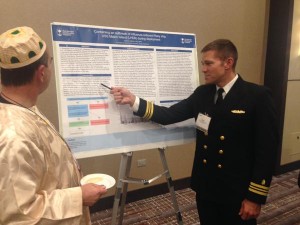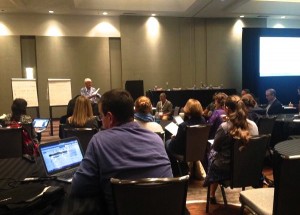By Dr. Andy Baldwin, CFHI Alumni Advisory Board (AAB) Member
Greetings from Denver! My mind is racing with excitement and ideas after spending the past three days with fellow family physicians passionate about global health at the American Academy of Family Physicians (AAFP) Global Health Workshop at the Grand Hyatt in Denver, Colorado. The organizers did a fantastic job establishing several tracks and special sessions that ran throughout the conference—General Plenary Sessions, Global Expansion of Family Medicine, Reflections in Global Health, Global Health Lecture Series, Focus on Research, Case Studies in Program  Design, Ideas Worth Sharing and Facilitated Discussions. I had the opportunity to present at the Ideas Worth Sharing session, condensing two years of work in El Salvador into a 7-minute presentation. It was rapid fire. There were also two poster presentation sessions, of which I was fortunate enough to have my shipboard influenza outbreak case featured. The best part about the workshop was the intimate size of the group, allowing for collaborative discussions, mentor-mentee interactions, and sharing of stories. This is what the future of Global Health depends on—relationships. The opening plenary speaker, William Ventres, MD spoke about the work of global family medicine being one of creating, developing, and sustaining relationships. The other plenary speaker whose words resonated for me was Lynn Eckhert, MD who encouraged all of us to “tell the story” of global family medicine. Our lives are full of stories around the globe, and by sharing it defines us, and allows others to learn and gain appreciation. As faculty in charge of developing a global health track at Fort Belvoir Community Hospital Family Medicine residency, I found it incredibly helpful to go to
Design, Ideas Worth Sharing and Facilitated Discussions. I had the opportunity to present at the Ideas Worth Sharing session, condensing two years of work in El Salvador into a 7-minute presentation. It was rapid fire. There were also two poster presentation sessions, of which I was fortunate enough to have my shipboard influenza outbreak case featured. The best part about the workshop was the intimate size of the group, allowing for collaborative discussions, mentor-mentee interactions, and sharing of stories. This is what the future of Global Health depends on—relationships. The opening plenary speaker, William Ventres, MD spoke about the work of global family medicine being one of creating, developing, and sustaining relationships. The other plenary speaker whose words resonated for me was Lynn Eckhert, MD who encouraged all of us to “tell the story” of global family medicine. Our lives are full of stories around the globe, and by sharing it defines us, and allows others to learn and gain appreciation. As faculty in charge of developing a global health track at Fort Belvoir Community Hospital Family Medicine residency, I found it incredibly helpful to go to  sessions focusing on global health curriculum development. The number of medical schools and family medicine residency programs with “global health” tracks is growing substantially. We also learned how to do journal clubs more effectively, as well as ethical approaches to Global Health engagements. One of the challenges in global health education is that competencies have not been standardized yet, making it difficult to determine a learners level of proficiency with global health. It was exciting to see the work that Jessica Evert, MD, Executive Director of CFHI, is doing to achieve this. She referenced her recent publication in the Annals of Global Health with the Consortium of Universities for Global Health (CUGH) that proposes four levels of Global Health competency. Global Family Medicine is a relatively young field, and it was an honor to be in the midst of those forging its path. As stewards of global health we are making progress toward a more connected and healthier world. I’m already looking forward to next year!
sessions focusing on global health curriculum development. The number of medical schools and family medicine residency programs with “global health” tracks is growing substantially. We also learned how to do journal clubs more effectively, as well as ethical approaches to Global Health engagements. One of the challenges in global health education is that competencies have not been standardized yet, making it difficult to determine a learners level of proficiency with global health. It was exciting to see the work that Jessica Evert, MD, Executive Director of CFHI, is doing to achieve this. She referenced her recent publication in the Annals of Global Health with the Consortium of Universities for Global Health (CUGH) that proposes four levels of Global Health competency. Global Family Medicine is a relatively young field, and it was an honor to be in the midst of those forging its path. As stewards of global health we are making progress toward a more connected and healthier world. I’m already looking forward to next year!
